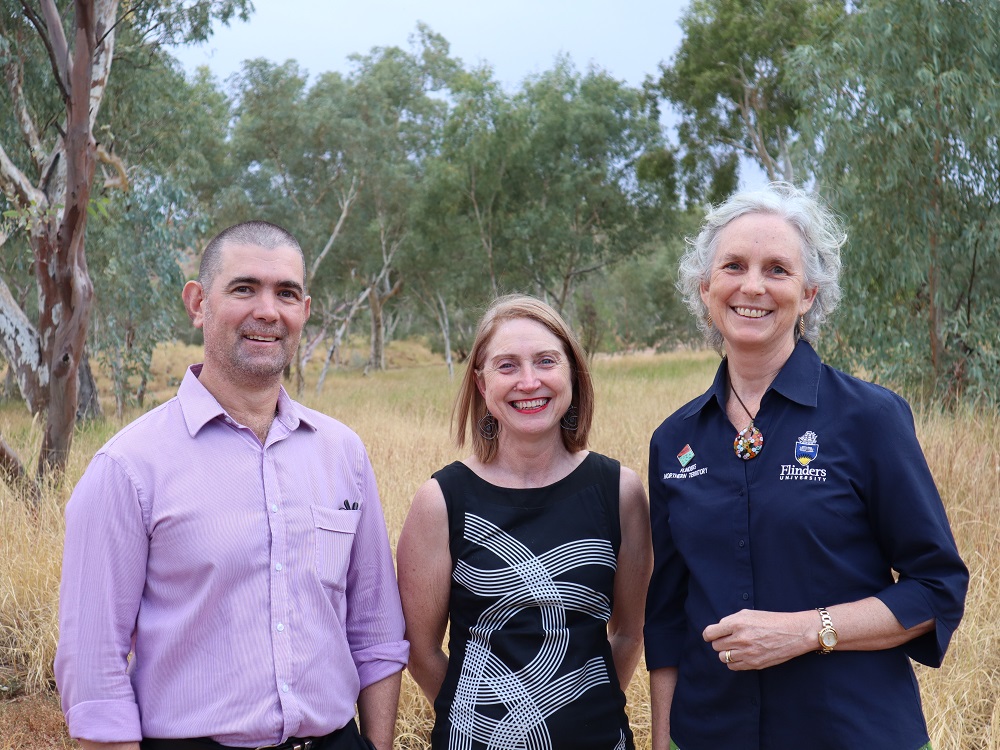
By Judith Aisthorpe
Flinders University is celebrating 25 years of longitudinal clinical placements for medical students in the Northern Territory (NT).
The Northern Territory Clinical School began in 1997 as a program designed to educate medical students in the Northern Territory with experiences aimed at graduating a workforce fit for practice in the context of remote and Indigenous communities.
The Northern Territory Medical Program (NTMP) – taught entirely in the NT – was established 14 years later in 2011 in collaboration with Charles Darwin University and funded by the Northern Territory Government and the Australian Government under the Rural Health Multidisciplinary Training program.
Clinicians in NT general practices, hospitals and community clinics continue to facilitate education and mentor students locally, delivering graduates into the Territory workforce.
Dean of Rural and Remote Health for Flinders College of Medicine and Public Health, Professor Robyn Aitken says the NT Clinical School was an integral part of the journey to the NT Medical Program.
“Training locally in our clinical settings has had a positive impact on boosting the Territory medical workforce for 25 years,” she says.
The NT Clinical School was established to provide a regional clinical training pathway for students to complete the final two years of their four-year medical degree in the NT.
Extending this to the full four years of the Doctor of Medicine for local students and Aboriginal and Torres Strait Islander students has been essential to build an ongoing NT educated
local medical workforce.
NTMP director Professor Emma Kennedy says the NT Clinical School built on the expertise and depth of skills needed to teach within the clinical context in the NT.
“The NT Clinical School began a new chapter in longitudinal clinical placements in medicine within the Territory,” Professor Kennedy says.
“This cleared the way for local program development and strengthening supervision.”
Flinders University will celebrate the milestone achievement of the NT Clinical School in 2022.
Read more about the people who have made a difference in our book Flinders University- Celebrating 25 Years in the NT
NT Clinical School graduate comes full circle
Dr Paul Secombe (BMBS(GradEntry) ’06) is one of more than 375 Flinders University medical graduates who attended the University’s NT Clinical School or graduated from the NT Medical Program. He has devoted his career to rural and remote medicine, clinical education, and research.
Dr Secombe began his career as an audiologist working in Darwin before moving to Adelaide in 2003 to enter the Flinders graduate entry medical program. He was able to return to Darwin in 2005 to complete the last two years at the NT Clinical School. He spent time at several remote locations, including Alice Springs and Jabiru, where the disparities in health care access and outcomes for Australian First Nations people became clearer to him.
He undertook his training in intensive care medicine in Adelaide and Bendigo before moving to Alice Springs in 2015. In 2017 he was named the Northern Territory Clinical Educator of the Year. He currently works as an Intensive Care Consultant at Alice Springs Hospital, where he also undertakes teaching and research with Flinders University.
Dr Secombe is undertaking his PhD in critical care outcomes of Aboriginal and Torres Strait Islanders in ICU at the School of Public Health and Preventive Medicine at Monash University.
He is a Specialist Clinician, a Fellow of and a Supervisor of Training with the College of Intensive Care Medicine, and clinical lead for the Australian and New Zealand Intensive Care Society’s Centre for Outcome and Resource Evaluation Adult Patient Database, where he is involved in quality assurance, benchmarking and research.
“My time at the Flinders University NT Clinical School highlighted the importance of teamwork in the delivery of health care and the value of consultant led teaching in medical education.”
“I remain inspired by many of the consultants who were involved in medical education through the NT Clinical School,” says Dr Secombe.

